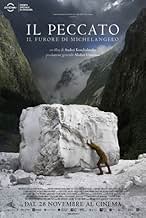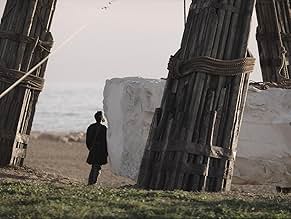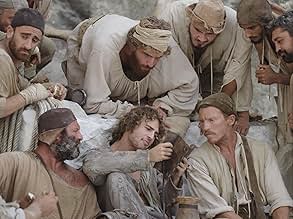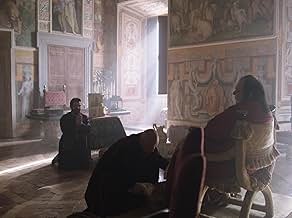IMDb RATING
6.8/10
1.5K
YOUR RATING
The life of Michelangelo Buonarroti.The life of Michelangelo Buonarroti.The life of Michelangelo Buonarroti.
- Director
- Writers
- Stars
- Awards
- 3 wins & 2 nominations total
- Director
- Writers
- All cast & crew
- Production, box office & more at IMDbPro
Featured reviews
10whotheff
Instead of being 24 pictures per second, this movie is 24 paintings per second. Contrary to modern cinema camera is very still. Instead of boring, static actors, we have static frames with a lot of movement in them with perfect angles for every single shot. It was so full of atmosphere, 100% realism and natural sounds that I did not blink for two hours. But instead of being some fancy art film, it tells a story which is very passionate, moving, dynamic. The protagonist lives through heaven and hell in following hos passion and this is so natural and real, that combined with the perfect atmosphere and realism, it made me feel as if I was there with him. And I've seen quite a lot of movies and hard to impress. Every scene, every inch of the screen, every sound, every second has meaning. Even quiet, still shots are felt so heavy, that there is no doubt you would feel them too.
The feeling of the age is so true, everything is so analog. As if no computer was used in the making of this film. I can only imagine the tons of hard work put into it to create this realism. Now I want to see more of Konchalovsky!
The feeling of the age is so true, everything is so analog. As if no computer was used in the making of this film. I can only imagine the tons of hard work put into it to create this realism. Now I want to see more of Konchalovsky!
Knowledge. Loyalty. Truthfulness. Guilt. Perseverance. Effort. Strength. Love. Spirituality.
If you want to learn a thing or two about the above, it's a must to watch.
Nice work with beautiful scenes recreating the atmosphere of those times perfectly well.
Michaelangelo was a genius sculptor and each of his creations move the soul even of modern people, lots of whom have hardly any taste of art at all. This film is artistic enough, beautiful and talented, made by a very professional director of soviet school. Just the right background to tell a story of a genius.
No soundtrack can also mean no noise pollution. I enjoyed everything about this movie
The main thing I would like to point out is that every single scene from this movie was like a beautiful painting straight out of an Italian museum. I can't remember when was the last time the visuals of a movie stunned me so greatly that I was with each scene change surprised by the beauty of the images.
Secondly, the feeling I get reading the rest of the reviews, and hearing other people comment on the movie, is that that people almost expect this movie to be a some sort of thriller depicting the genius of Michelangelo, the person we all know as the one of the worlds greatest artists of all time. But the greatness of this movie is in the contrary - Michelangelo is portrayed as a mere, sinning human - who steals, betrays, lies, and also hates showering. He is a imperfect person just like any other, haunted by his fears and suspicions and I can't shake off the feeling that people did not (or did not want) to see Michelangelo in those lens. But for me that is the main thing that makes this movie so great - the viewer can share Michelangelos' emotions and thoughts as if they were their own or of their friend, since the artists is another common, but very talanted man, and not some untouchably skilled alien of the past.
Thirdly, the movie shows us only a fragment of the artists life, and a fragment describing the very beginning of the sculpting process, and it is that time that the fullness of Michelangelos' character can be met, like it is in the movie. Who wants to see a historical documentary about his whole life? You can tune into the History channel if your into that. On the other side, the movie is an artistic take at an artists life, excellently describing Michelangelos true identity, his problems and thoughts, related or not to his work.
For me, the point and the idea of the movie is that Michelangelos works such as David and Pieta were not thought up in the vast and luxuriose castles and churches of Florence, while the artists was enjoying a cup of tea snf reading philospophy, but instead, in the middle of a marble mine in high up in the mountains, alongside plain working men, when the idea arises in sight of a mere daughter of one of the workers leans on a marble rock for a short afternoon sleep - it is that plain scene which inspires the divine masterpiece of the artists work today. This is what makes the movie so down to earth and realistic, and in combination with the incredible scenery, makes the viewer feel like he is in 16th century Italy for two hours.
Secondly, the feeling I get reading the rest of the reviews, and hearing other people comment on the movie, is that that people almost expect this movie to be a some sort of thriller depicting the genius of Michelangelo, the person we all know as the one of the worlds greatest artists of all time. But the greatness of this movie is in the contrary - Michelangelo is portrayed as a mere, sinning human - who steals, betrays, lies, and also hates showering. He is a imperfect person just like any other, haunted by his fears and suspicions and I can't shake off the feeling that people did not (or did not want) to see Michelangelo in those lens. But for me that is the main thing that makes this movie so great - the viewer can share Michelangelos' emotions and thoughts as if they were their own or of their friend, since the artists is another common, but very talanted man, and not some untouchably skilled alien of the past.
Thirdly, the movie shows us only a fragment of the artists life, and a fragment describing the very beginning of the sculpting process, and it is that time that the fullness of Michelangelos' character can be met, like it is in the movie. Who wants to see a historical documentary about his whole life? You can tune into the History channel if your into that. On the other side, the movie is an artistic take at an artists life, excellently describing Michelangelos true identity, his problems and thoughts, related or not to his work.
For me, the point and the idea of the movie is that Michelangelos works such as David and Pieta were not thought up in the vast and luxuriose castles and churches of Florence, while the artists was enjoying a cup of tea snf reading philospophy, but instead, in the middle of a marble mine in high up in the mountains, alongside plain working men, when the idea arises in sight of a mere daughter of one of the workers leans on a marble rock for a short afternoon sleep - it is that plain scene which inspires the divine masterpiece of the artists work today. This is what makes the movie so down to earth and realistic, and in combination with the incredible scenery, makes the viewer feel like he is in 16th century Italy for two hours.
I found watching Il Peccato / Sin (2019) a delight!
Some user reviews of this film express their disappointment in the fact that you don't see the great master in action, working on marble or drawing. But I see that differently. Being trained as an art historian, I recognized the events and characteristics of Michelangelo shown in this film from the historical documents that have survived from that time. Having spent a significant amount of time studying the subject before making the film, I believe Konchalovskiy in particular closely read Giorgio Vasari's Lives of the Most Excellent Painters, Sculptors, and Architects (1550/1568), a contemporary collection of biographies of Renaissance artists (in the case of Michelangelo, Vasari knew him personally), as the major themes in the film correspond with Vasari's account of this episode in Michelangelo's long life.
Echoing his early masterpiece Andrey Roublev (1966), which he made together with Andrei Tarkovsky, Il Peccato shows how artists are subjects of the time they live in, dependent on power structures and turbulences in violence and prosperity. The film gives a good insight in Michelangelo's social interactions with his family, rivalling artists, and patrons. Moreover, the cinematography is impressive, and the largely unprofessional acting crew performed overall very strong. A great addition to the genre of movies about artists, much more nuanced and intelligent than the classic The Agony and the Ectasy (1965). Hopefully, Michelangelo's rival Leonardo da Vinci will get a biopic of comparable quality soon!
Some user reviews of this film express their disappointment in the fact that you don't see the great master in action, working on marble or drawing. But I see that differently. Being trained as an art historian, I recognized the events and characteristics of Michelangelo shown in this film from the historical documents that have survived from that time. Having spent a significant amount of time studying the subject before making the film, I believe Konchalovskiy in particular closely read Giorgio Vasari's Lives of the Most Excellent Painters, Sculptors, and Architects (1550/1568), a contemporary collection of biographies of Renaissance artists (in the case of Michelangelo, Vasari knew him personally), as the major themes in the film correspond with Vasari's account of this episode in Michelangelo's long life.
Echoing his early masterpiece Andrey Roublev (1966), which he made together with Andrei Tarkovsky, Il Peccato shows how artists are subjects of the time they live in, dependent on power structures and turbulences in violence and prosperity. The film gives a good insight in Michelangelo's social interactions with his family, rivalling artists, and patrons. Moreover, the cinematography is impressive, and the largely unprofessional acting crew performed overall very strong. A great addition to the genre of movies about artists, much more nuanced and intelligent than the classic The Agony and the Ectasy (1965). Hopefully, Michelangelo's rival Leonardo da Vinci will get a biopic of comparable quality soon!
Did you know
- TriviaShot entirely in Italy. The movie was shot in Rome and its environs and in Tuscany, including at the Carrara quarry where Michelangelo got his marble.
- Quotes
Michelangelo Buonarroti: Money always rubs elbows with infamy.
- ConnectionsReferenced in Vecherniy Urgant: Andrei Konchalovsky/Pompeya (2019)
- How long is Sin?Powered by Alexa
Details
Box office
- Budget
- €15,000,000 (estimated)
- Gross worldwide
- $243,043
- Runtime2 hours 14 minutes
- Color
- Aspect ratio
- 1.33 : 1
Contribute to this page
Suggest an edit or add missing content

![Watch Trailer [OV]](https://m.media-amazon.com/images/M/MV5BYThkZDVkMGQtNGZiYS00NzMwLWFkOWUtYTFhYThiN2E4MTQwXkEyXkFqcGdeQXRyYW5zY29kZS13b3JrZmxvdw@@._V1_QL75_UX500_CR0)























